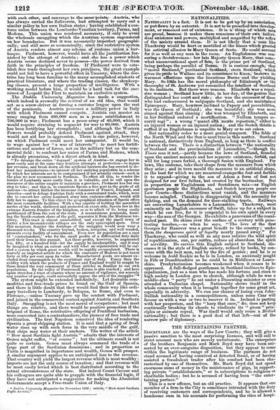NATIONALITIES.
NATIONALITY is a fact. It is not to be got up by an association, or put down by an autocrat. It is not to be preached into develop- ment, or reasoned out of existence. It is a thing of which met are proud, because it makes them conscious of their own dual existence and powers, multiplied and magnified by the reflex of the society around them. It is not likely that a man like Thackeray would be hurt or mortified at the hisses which greeted his satirical allusion to Mary Queen of Scots. He could account for it as well as any man in the room. An Englishman was cell_ suring a Seotehwoman her late Majesty Queen Mary, that some- what unconventional sport of fate, ,isafe prime pet of Scotland, being perhaps the parallel of Burns. It is curious enough, that dual existence and powers, multiplied and magnified by the reflex of the society around them. It is not likely that a man like Thackeray would be hurt or mortified at the hisses which greeted his satirical allusion to Mary Queen of Scots. He could account for it as well as any man in the room. An Englishman was cell_ suring a Seotehwoman her late Majesty Queen Mary, that some- what unconventional sport of fate, ,isafe prime pet of Scotland, being perhaps the parallel of Burns. It is curious enough, that
moral Scotland," puritanical Scotland, stern Scotland, which gives its pride to Wallace and its conscience to Knox, bestows its warmest affections upon the licentious Burns and the yieldin& Mary. So little has the moral philosophy of Edinburgh or the theosophy of St. Andrews yet reconciled the intellect of Scotland to its instincts. But there were reasons. Elizabeth was a repul. sive woman ; Scotland knew little, in her day, of the genius that distinguished her court and rule ; she was the successor of those who had endeavoured to subjugate Scotland, and she maintained Episcopacy. Mary, however inclined to Papacy and peccabilities, was the Queen of Scotland.; she was beautiful ; she was more sinned against than sinning ; she was wronged by Elizabeth, and in her Scotland endured a mortification. " Nullum tempus oe- omit regi " ; a wrong "manet alth mente repostum," either 'to an injured woman or an injured nation ; and the Scotch thistle is ruffled if an Englishman is unpolite to Mary or to oat cakes.
But nationality cedes to a more genial conquest. The fable of the North Wind and the Sun is most true in this matter. Scotland is national, distinctively from England, so long as there is conflict between the two. There is a distinction between " the nationality of Scotland and the provincialism of Lancashire,"--though the Times sees it not,—partly because the laws of Scotland, founded upon the ancient manners and her separate existence, forbid, and will for long years forbid, a thorough fusion with England. For laws, like costume, take their shape from the manners from which they arise ; and in turn mould the manners to an artificial shape, as the boot for which we are measured crampsthe foot and forbids it to expand—giving to the son of Adam a form of foot not designed for our first father, but created by the bootmaker. But in proportion ea Englishmen and Scotchmen mix—as English sportsmen people the Highlands, and Scotch lawyers people our Law Courts—these distinctions must vanish, and the manners become mingled. Clanship is disappearing with the necessity for fighting, and on the demand for deer-stalking tracts. Railways are converting Lanarkshire to a Lancashire. Thackeray, most eminently an English successor of Swift, takes up for a subject in which he can live, for it is congenial to his own spirit in every way—the sera of the Georges. He exhibits a panorama of the reani- mated past. He skims over the surface of a century with pene- trating touches,—as when he says, " The love of the first Georges for Hanover was a great benefit to the country ; under them the dangerous spirit of loyalty nearly passed away." For Thackeray, who could as well as any man satirize the wild. spirit of republicanism, can, per contra, reduce ad absurdum the spirit of servility. He carries this English subject to Scotland, dis- cusses it in the style of English society, refined by books, by con- verse with the best men, and by the fire of genius ; and he is as welcome in Auld Reelde as he is in London, as anxiously sought in Fife or Dumfriesshire as he could be in. Middlesex or Lanca- shire. Presbyterianism becomes weakened when it ceases to be oppressed. A. full-fledged gentleman in Scotland inclines to Epis- copalianism, just as a man who has made his fortune and risen to high society in London goes to church, although while he was a middle-class " party" he sat under a Dissenting minister or even attended a Unitarian chapel. Nationality shows itself in the whole community when it is brought together for some great act, especially in adversity. We run our chance of losing even John- Bullish nationality in a cosmopoliteness, unless some Czar will favour us with a war or two to recover it in. Ireland is parting with her pauperism, and the "harp that once," &c. does not keep continually breaking its chords to vindicate its " green" prin- ciples or animate repeal. War itself would only rouse a British nationality ; but there is a good deal of that left—out of the narrow pale of diplomacy.


























 Previous page
Previous page